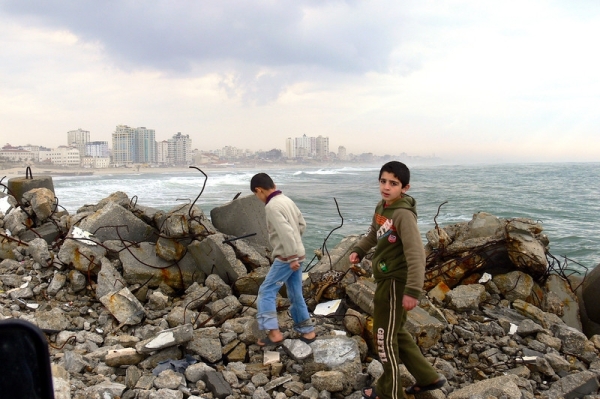The ICJ has spoken — the EU must listen and change course
The International Court of Justice has spoken. The judges nearly unanimously noted that the facts "are sufficient to conclude" that the right of Gaza Palestinians to be protected from genocide is plausible.
The court’s considerations and orders come as a relief. In many European countries the discussion of this war has been stifling. The most egregious Israeli actions, such as cutting access to food and water for two million civilians, have either been ignored or framed as some unfortunate and unavoidable consequence of the war.
-

Germany has been a ‘bad friend’ to Israel: instead of supporting Israeli voices calling for a ceasefire, it has largely sided with the Netanyahu government’s campaign of systematic destruction and humanitarian disaster (Photo: German Finance Ministry)
This should be a thing of the past. Whether or not Israel intends to commit genocide (the court did not rule on this, but it did not consider the accusation completely implausible), the absolute urgency now is to save the lives and the well-being of two million Palestinians and the Israeli hostages, and to seek a way to end the war as soon as possible.
The EU must make a significant course correction.
Positively, it supports the orders’ "full, immediate and effective implementation". But a lot more will be required to ensure the orders are meaningfully implemented and to give respect to rule-based international order.
Statements will not make the Benjamin Netanyahu government change course. It has ignored many calls by the US, on whose support it principally depends, to change its war conduct.
The EU needs to condition any support to Israel on a tangible improvement of the situation of Palestinian civilians.
Tangible improvements can be measured: by the number of aid trucks that the Israeli government allows into the Gaza strip and by the resumption of water supply and electricity.
The EU is divided. Foreign policy chief Josep Borrell has rightly favoured a more pro-human rights course for a while, as have Spain, Ireland and Belgium, which currently holds the EU presidency.
At the other end of the spectrum, the German government has looked the other way in the face of systematic and manifest violations of international humanitarian law.
Germany has been a ‘bad friend’ to Israel: instead of supporting Israeli voices calling for a ceasefire, it has largely sided with the Netanyahu government’s campaign of systematic destruction and humanitarian disaster. This undermines any future solution between Israel and the Palestinians. The EU’s course correction will depend critically on Germany changing course.
The war tarnishes the EU’s reputation globally, it reduces the chances to a re-election of Biden in November and it distracts from helping Ukraine to defend and recover its territory from Russia.
The solution to the insoluble problem
Paradoxically, while the Israel-Gaza conflict seems intractable, few other conflicts in the world have such a clear and widely-agreed upon solution: an Israeli and a Palestinian state. The Arab League has endorsed it. The EU has endorsed it. The UN has endorsed it. The US has endorsed it.
Beyond immediate steps to protect civilians, the EU finally needs to open its foreign policy toolbox to work on the two-state-solution on a credible manner. In his opinion article in the Washington Post, Biden insisted that the two-state solution must be pursued, that the Palestinian state would consist of the West Bank and Gaza, and that "the work must begin now".
Biden’s plan would require a huge political investment by the US administration to persuade this Israeli government to change course.
That investment is not yet visible. It is even less visible on the part of the European Union. While Borrell outlined a position, it is unclear to which extent the EU institutions and the member states are ready to align all their policies — weapons’ delivery, security and economic co-operation, diplomacy, visa regime — behind this position.
If you want to know if governments are serious about a two-state solution, the West Bank is the immediate litmus test.
Since the Hamas massacre of Israelis (and some foreigners) on 7 October, the situation in the West Bank (including East Jerusalem) has deteriorated rapidly: 360 Palestinians have been killed, including 92 children. Many more have been injured.
Beyond stopping that violence, the Israeli government must be persuaded to work seriously with the Palestinian Authority to rapidly improve the situation of Palestinians in the West Bank, Gaza and East Jerusalem. Consideration must also be given to holding future Palestinian elections to renew the legitimacy of the Palestinian Authority. The last elections were held in 2006.
Without a massive political effort, the two-state solution is likely to remain what it has been for many years — a convenient slogan to mask a terrible situation.

